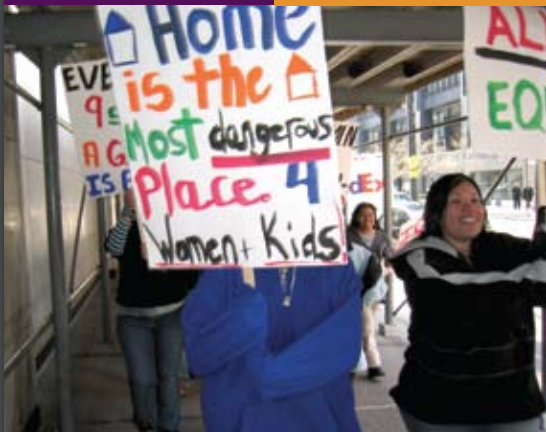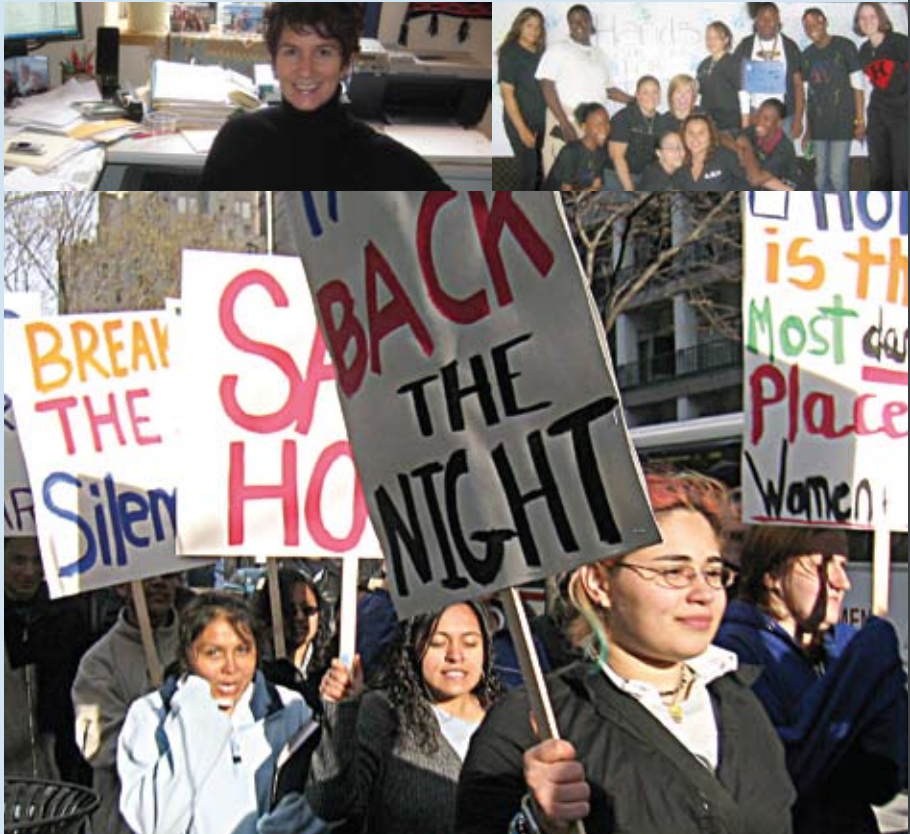
In their DePaul class, students address topics related to teen violence;
once a week they also go to high schools served by the programs where
they work directly with high school students impacted by the problem.
DePaul students in the class also participate in a planning session once a
week to prepare for their work at the high schools. Undergraduate interns
plan activities for high school students around a specific topic related to
power, gender, media or other issues. The class is now in its fourth year and
has engaged approximately 50 DePaul students with about 180 high school
student participants. For high school students, the project does not just
focus on raising awareness about teen violence – it encourages students to
become activists on the issue.
Beth Catlett, who teaches the Teen Violence Prevention class, explains
that the class and program complement each other. “In the seminar, we
critically examine scholarship in the field on feminist and liberatory teaching
pedagogies, adolescent development and urban youth,” says Catlett, who is
Assistant Professor and Director of Graduate Studies for the Women’s and
Gender Studies Program. “We engage with that scholarship, and examine
ways it can be useful for us when working with high school students. Meanwhile, we use our field experience in the high schools to inform what we are
learning in the classes. It’s a synergistic process.” For DePaul students, that can
mean studying educator Paulo Friere’s classic book “Pedagogy of the Oppressed” one day – and listening as a high school student shares how dating
violence has impacted her, her family and the larger community the next day.
Heather Flett, who teaches the class with Catlett, says Take Back the
Halls challenges DePaul students to grow through the program.

“We try to
challenge DePaul students to form relationships with high school students,
appreciate the differences and similarities,” says Flett, a social worker who is
also the director of Take Back Our Lives. “DePaul students try to make the theories they learn in a classroom relatable to an inner-city
kid. The goal is to encourage high school students to be
the experts on this issue – they are the ones who will get
the message about violence prevention out to people
their age.”
Students as Service-Learners
DePaul junior and Women’s and Gender Studies
major Emily Baas works with North Lawndale College
Prep (NLCP) students through the program. “A lot of
students in the high school have experienced dating
violence, or know someone who has,” she says. “They are
very aware that there is a problem. Take Back the Halls
is a way for them to vent these feelings and creatively
express what they are thinking. So many times, kids are
silenced by the greater Chicago community.”
“This program,” adds Baas, who grew up in Valparaiso, Indiana, “has given me a look into a different community I probably would have not had the opportunity
to go into. Even traveling to North Lawndale has shown
me how segregated the city can be. I also think it has
changed the way I look at high school students -- now I
see, more than before, that their voice is as important as
my voice. Meanwhile, this program has helped me put
the theories we learn in class into practice.”
Fatima Arain, who graduated from DePaul last
spring with a degree in Women’s and Gender Studies,
worked as an advisor for Take Back the Halls last year at
Clemente High School. “In terms of my activism,” she
says, “I really blossomed in my last year at DePaul, and
that had a lot to do with Take Back the Halls. I remember
we would be driving back to Lincoln Park from the high
school,” she says, “and we would be in great moods. The
students at Clemente were so smart and so inspiring.
They learn that where they are coming from is important
and needs to be heard. The experience they’ve lived is a
form of knowledge.”
Meanwhile, Katrina Wyss, a research assistant for the
program who works with all three schools, says that high
school students in “Take Back the Halls” respect DePaul
students involved in the program – students who, in many
cases, are only a few years removed from high school themselves. “High school students can see themselves in DePaul
interns. I think they are more likely to take what interns
say to heart than if they were talking to older adults,” says
Wyss, who is pursuing a master’s in nonprofit management
through DePaul’s Public Service Management Program
and collects data from students for Take Back the Halls.
Partners
Service learning courses offered through the Steans
Center are typically characterized by strong partnerships
between the university and a community-based organization; in this case, that organization is a neighborhood
school. Jill Bass, a teacher at NLCP who is a liaison for
Take Back the Halls at the school, simply says the program works well and fits “so smoothly” at NLCP. “Most of
the students at our school have been in this program for
two years,” says Bass, who is the school’s Civic Engagement Program Director. “Take Back the Halls connects
students to something that gives them a purpose.”
That’s certainly true for Candice Williams. “I specifically relate to issues raised by Take Back the Halls,” says
Williams, a sophomore at NLCP. “I don’t think teens
talk about teen dating violence a lot, but I know it happens.” Williams, in fact, related a story about someone
she knows who was a victim of teen dating violence “two
weeks before prom.”
Williams adds that because there are three boys in
the class, “We get both sides of the story about teen dating violence.” Two of those boys, seniors Jonathan Hardnett and Derrick Webb, both say the program is having an
impact on them. “The first step is talking about violence,
letting your feelings out,” says Webb. “After talking about
it you realize you are not the only one dealing with the
problem.” “It’s something worth talking about,” adds Hardnett. “Violence is in the school, in the street, in the home
– you can’t get away from it. Some people need a place of
commonality to talk about their experience. This program
brings you closer and closer because we see we have a
voice to talk about our experiences.”
Students like Hardnett and Webb are also using their
voices to promote social change. Last year, they joined
many students in the program in a Take Back the Night
march. This year at NLCP, students are planning a poetry
jam that features poetry, rap and the presentation of
student videos on themes related to teen dating violence.
Like many in the violence prevention movement,
one of the common links for DePaul students interning
at high schools and the students they work with is a word
that keeps reemerging: transformation. “So many DePaul
students say to me this class and program has transformed
then,” Catlett says. “There is a real sense of excitement
about learning outside of the classroom, walking out of
the ivory tower. They see in a very concrete way how real
concerns about sexism, classism, homophobia, racism and
other issues impact kids. At the same time, they gain a new
appreciation for the challenges and potential of youth.”